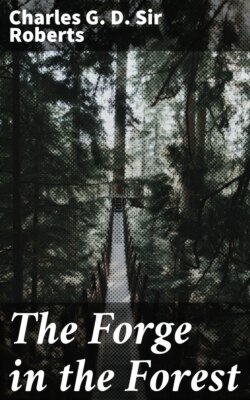Читать книгу The Forge in the Forest - Sir Charles G. D. Roberts - Страница 5
На сайте Литреса книга снята с продажи.
A Foreword
ОглавлениеTable of Contents
Where the Five Rivers flow down to meet the swinging of the Minas tides, and the Great Cape of Blomidon bars out the storm and the fog, lies half a county of rich meadow-lands and long-arcaded orchards. It is a deep-bosomed land, a land of fat cattle, of well-filled barns, of ample cheeses and strong cider; and a well-conditioned folk inhabit it. But behind this countenance of gladness and peace broods the memory of a vanished people. These massive dykes, whereon twice daily the huge tide beats in vain, were built by hands not suffered to possess the fruits of their labour. These comfortable fields have been scorched with the ruin of burning homes, drenched with the tears of women hurried into exile. These orchard lanes, appropriate to the laughter of children or the silences of lovers, have rung with battle and run deep with blood. Though the race whose bane he was has gone, still stalks the sinister shadow of the Black Abbé.
The low ridge running between the dykelands of the Habitants and the dyke-lands of the Canard still carries patches of forest interspersed among its farms, for its soil is sandy and not greatly to be coveted for tillage. These patches are but meagre second growth, with here and there a gnarled birch or overpeering pine, lonely survivor of the primeval brotherhood. The undergrowth has long smoothed out all traces of what a curious eye might fifty years ago have discerned,—the foundations of the chimney of a blacksmith's forge. It is a mould well steeped in fateful devisings, this which lies forgotten under the creeping roots of juniper and ragged-robin, between the diminished stream of Canard and the yellow tide of Habitants.
The forest then was a wide-spreading solemnity of shade wherein armies might have moved unseen. The forge stood where the trail from Pereau ran into the more travelled road from the Canard to Grand Pré. The branches of the ancient wood came down all about its low eaves; and the squirrels and blue jays chattered on its roof. It was a place for the gathering of restless spirits, the men of Acadie who hated to accept the flag of the English king. It was the Acadian headquarters of the noted ranger, Jean de Mer, who was still called by courtesy, and by the grace of such of his people as adhered to his altered fortunes, the Seigneur de Briart. His father had been lord of the whole region between Blomidon and Grand Pré; but the English occupation had deprived him of all open and formal lordship, for the de Briart sword was notably conspicuous on the side of New France. Nevertheless, many of Jean de Mer's habitants maintained to him a chivalrous allegiance, and paid him rents for lands which in the English eye were freehold properties. He cherished his hold upon these faithful folk, willing by all honest means to keep their hearts to France. His one son, Marc, grew up at Grand Pré, save for the three years of his studying at Quebec. His faithful retainer, Babin, wielding a smith's hammer at the Forge, had ears of wisdom and a tongue of discretion for the men who came and went. Once or twice in the year, it was de Mer's custom to visit the Grand Pré country, where he would set his hand to the work of the forge after Babin's fashion, playing his part to the befooling of English eyes, and taking, in truth, a quaint pride in his pretended craft. At the time, however, when this narrative opens, he had been a whole three years absent from the Acadian land, and his home-coming was yet but three days old.
